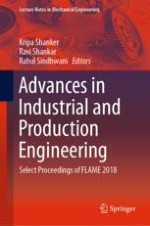2019 | OriginalPaper | Buchkapitel
Framework the Food Supply Chain Network in the Present Indian Scenario
verfasst von : Bhavya Nidhi Vats, Anuj Gupta, Ganesh Sharma
Erschienen in: Advances in Industrial and Production Engineering
Verlag: Springer Singapore
Aktivieren Sie unsere intelligente Suche, um passende Fachinhalte oder Patente zu finden.
Wählen Sie Textabschnitte aus um mit Künstlicher Intelligenz passenden Patente zu finden. powered by
Markieren Sie Textabschnitte, um KI-gestützt weitere passende Inhalte zu finden. powered by
